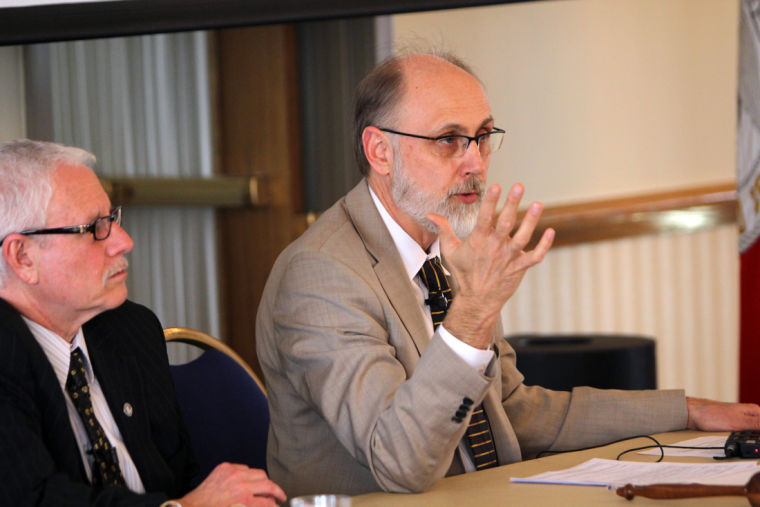Grievance policy passes with applause
NIU President Doug Baker discusses his trip to the State Senate, at which he and other university administrators testified about how a 12.5 percent or 20 percent budget would affect the university, during Wednesday’s University Council meeting in the Holmes Student Center. University Council members also voted to pass a student grievance policy and discussed how online class guidelines need to be reviewed by the council.
April 3, 2014
A grievance policy that will give students guidelines to resolving issues with faculty members was passed with 50 votes by the University Council Wednesday.
Student grievance policy
The student grievance policy has been a heavily discussed issue for more than 10 years. The policy, which is not yet in effect, will allow students to formally file a grievance against faculty members with whom students are having problems.
The policy passed University Council with 50 yeas, five nays and zero abstentions. The council applauded after the policy’s passage.
“It’s gone through so many different directions, and the committee this year has collaborated enough for the policy,” said Mike Theodore, Student Association chief of staff. Two years ago, Theodore took up the role of student advocate to the implementation of a student grievance policy, according to a March 19 Northern Star article.
Bill Pitney, chair of the University Affairs Committee, discussed the grounds, exceptions and procedures of the policy. Pitney said he took into consideration that there are other procedures for dealing with discrimination, sexual harassment or grade complaints in the policy.
Student retention
NIU President Doug Baker addressed student retention and its connection to the spring Bold Futures Workshops, which held its final workshop Wednesday.
The Bold Futures Workshops have community members sharing ideas to improve recruitment, retention and finances while exploring students’ future employment.
“Over 1,000 people participated in the [Bold Futures] Workshops in the past month,” Baker said.
Baker said attendees contributed good ideas at the workshops, but most of the ideas didn’t focus on student retention. The student retention rate was calculated to be 66 percent, with about a third of freshmen leaving between their first and second years.
Baker encouraged University Council members to mention the workshops to students so students can provide their own ideas on how NIU can improve student retention.
The Big Bold Event, where students’ experience assignments from the workshops will be on display, will be 5 to 6 p.m. on April 24 in the Duke Ellington Ballroom of the Holmes Student Center.
Distance education
Associate history professor Sean Farrell addressed the outdated guide for distance education courses offered by NIU, which allow students to take online courses.
Farrell said the guidelines stated they would be reviewed and altered every five years, but that hasn’t happened since the University Council passed the guidelines on Oct. 4, 2001.
“Online education is a rather rapidly changing and increasingly important field of higher education,” Farrell said.
Farrell said he reviewed the guidelines and updated them for University Council members to vote on.
One issue the Council had was the guidelines for Distance Education did not include the accessibility of instructor communicating with the classroom. The council decided the guideline voting will be postponed for the next University Council meeting on April 30.



